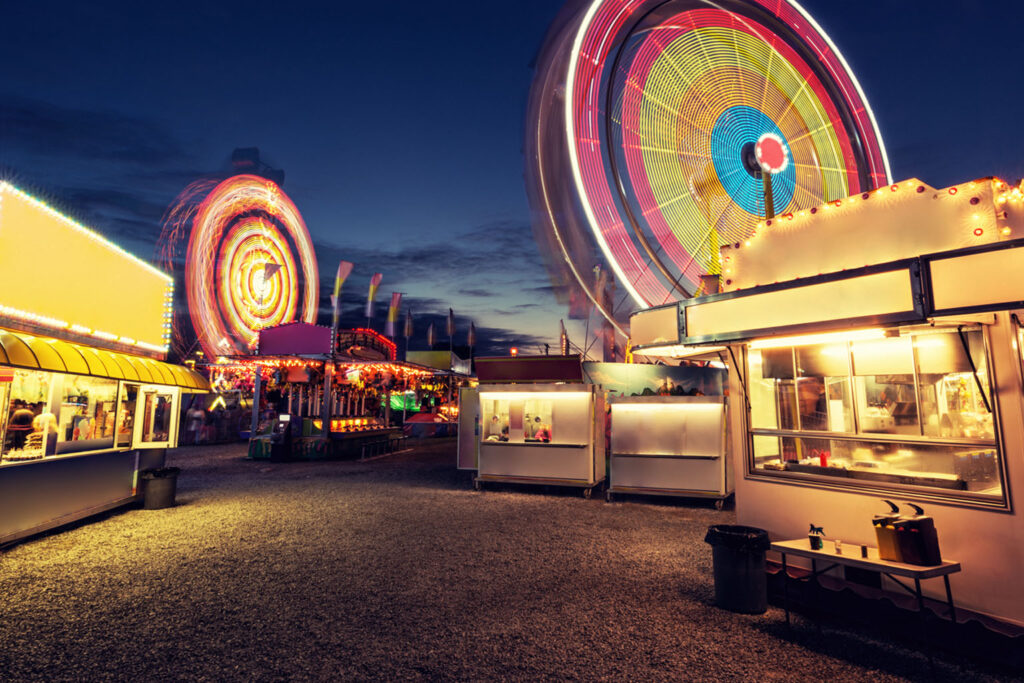Traveling Carnivals & Fairs: Risk of Injury and Litigation
As traveling carnivals and fairs wind down for the season, owners and operators can take some time to reflect on a whirlwind busy season. Dominating the conversation this season were the many COVID-related unknowns — Will there be mass gathering restrictions again? What are the safety procedures required in each new location?
With each passing day, there’s increased hope that next year’s festivities will be less dominated by the pandemic and maybe even a little more predictable. But even if pandemic-related concerns are minimized next year, owners and operators need to keep safety at the top of mind.
This offseason, take some time to revisit the critical risks and best practices that may have taken a backseat this past summer.
Risk of injury and equipment safety
Owners and operators should recognize there is little to no federal regulation or oversight on how rides are set up, maintained, or operated. It’s up to you and state laws that often vary widely to ensure you’re keeping attractions in good condition and operating order to avoid risk of injury and litigation.
Considering that carnivals and fairs often assemble and disassemble rides on a regular basis, it’s important to establish a solid checklist and follow-up with trained employees on any issues with the rides as soon as they become known. This will help reduce the impact of litigation if a guest decides to sue if injured.
The common causes of carnival and state fair injuries include:
- Machinery not properly inspected
- Operators not properly trained
- Unmarked hazards like spills and construction
- Electrical and wiring hazards
- Medical care not available during an emergency
Also read: County and State Fairs: 2021 Updates & Challenges
Food concessions
Who doesn’t love fair food? Everyone gets hungry at a carnival and fair, but food trucks and vendor stalls create risks. A single outbreak of foodborne illness can cost operators between $7,000 and $2.1 million in damages, depending on the severity. Food safety training is vital, as well as making sure each vendor has the proper permits to serve food and beverages.
Stay in compliance with food safety regulations and train staff on best practices like food handling, sanitation, liquor liability, and equipment maintenance. Keep your facilities looking clean and reduce slip and fall hazards by adding additional trash cans and assigning staff or volunteers to routinely empty them.
Event security
Event security is more important than ever. In 2020, a teen was shot at a county fair, and this year, there was a shooting incident at a Texas theme park. Active shooter incidents continue to be a risk, so owners and operators must perform risk assessments, have a security plan, and train staff and volunteers on what to do in emergencies.
Security logistics can be overwhelming, but it’s worth the time and effort to ensure your staff and guests are safe and exposures are kept to a minimum.
Also read: Liquor Liability: Is Your Event Covered?
Reduce your risk of litigation with fairground insurance coverage
A typical traveling carnival will have about 20 rides or attractions. These rides tend to be the biggest elements that need to be insured. The trailers, vans, and trucks that transport these rides across the country should also have coverage. Outside vendors need to have a certificate of insurance and must be able to show evidence of general liability insurance.
General liability, property, and workers’ compensation policies are precautions that carnival and fair owners and operators must take. A dependable fairground insurance plan will be vital if your equipment, tools, and more end up damaged or broken. It will also reduce your risk of litigation if an event gets canceled and assist with liability claims over injuries. You should also consider inland marine coverage, commercial auto coverage, and excess and umbrella coverage.
Here’s the breakdown:
- Umbrella and excess liability: This coverage is essential in protecting your company in the event of large liability claims.
- Commercial auto: Covers vehicles owned or used for and by the business.
- Inland Marine: Covers property that is not otherwise stationary or permanent including mobile rides and equipment/stock.
- Workers’ compensation: Varies by state but is required for businesses with employees.
By partnering with McGowan Allied Specialty Insurance, carnival and state fair owners and operators get the best of two long-serving insurance companies. Our team has more than 35 years of in-depth industry experience. Learn more about our coverages and contact us today.
